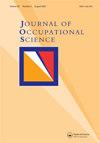Occupational science’s stalled revolution and a manifesto for reconstruction
IF 2.4
Q1 SOCIAL SCIENCES, INTERDISCIPLINARY
引用次数: 7
Abstract
ABSTRACT This publication develops a keynote presented at the 27th USC Chan Occupational Science Symposium, “Occupations disrupted: Pandemics and the reshaping of everyday life,” on November 5, 2021. I used the social theory of occupational reconstructions—shared problem-solving through narrative alignments and collective action—to reflect on occupational science’s progress since its founding 30 years ago. I argue that (1) the science of occupation has stalled in today’s neoliberal university; and that (2) ‘consequential questions’ must be formulated across the discipline to develop useful knowledge from different locations, positionalities, and contexts. A ‘consequential question,’ I propose, produces knowledge useful to solving problems of wide concern to the discipline, other disciplines, and the public; and sets up a scientific research program that progresses empirically and theoretically. I explain why the founders’ pragmatist framing of occupation as mind-body experience remains important to recent critiques of the discipline and its future advancement. Likewise, I explain how pragmatism can and must transact with various critical (Marxist, poststructuralist) philosophies and other (positivist, alternative) epistemologies regarding societal problems such as occupational justice, human rights, decolonization, political polarization, and the erosion of democracy. I suggest that federally funded biomedical research in the neoliberal university is not currently designed to advance a science of occupation, although it could if occupational scientists were to face the discipline’s contradictions under neoliberalism and reconstruct its common purpose.职业科学停滞不前的革命和重建宣言
摘要本出版物在2021年11月5日举行的第27届南加州大学陈职业科学研讨会上发表了主题演讲“职业被打乱:流行病和日常生活的重塑”。我使用了职业重建的社会理论——通过叙事对齐和集体行动共同解决问题——来反思职业科学自30年前成立以来的进步。我认为(1)职业科学在今天的新自由主义大学里停滞不前;以及(2)必须在整个学科中制定“后果性问题”,以从不同的位置、立场和背景发展有用的知识。我建议,一个“间接问题”产生的知识有助于解决学科、其他学科和公众广泛关注的问题;并建立了一个实证和理论相结合的科学研究计划。我解释了为什么创始人将职业视为身心体验的实用主义框架对最近对该学科及其未来发展的批评仍然很重要。同样,我解释了实用主义如何能够也必须与各种批判性(马克思主义、后结构主义)哲学和其他(实证主义、另类)认识论打交道,这些哲学和认识论涉及社会问题,如职业正义、人权、非殖民化、政治两极分化和民主的侵蚀。我认为,联邦政府资助的新自由主义大学生物医学研究目前并不是为了推进职业科学,尽管如果职业科学家在新自由主义下面对该学科的矛盾并重建其共同目的,这是可能的。
本文章由计算机程序翻译,如有差异,请以英文原文为准。
求助全文
约1分钟内获得全文
求助全文
来源期刊

Journal of Occupational Science
SOCIAL SCIENCES, INTERDISCIPLINARY-
CiteScore
4.30
自引率
41.70%
发文量
46
 求助内容:
求助内容: 应助结果提醒方式:
应助结果提醒方式:


